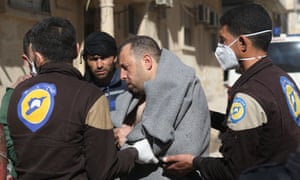 |
| A man receives treatment following the suspected chemical weapon attack in Khan Sheikhun in Idlib province, Syria. Photograph: Mohamed Al-Bakour/AFP/Getty Images |
Dozens of people have been killed in a suspected chemical attack in northern Syria, aid workers and local activists have said, in one of the largest mass casualty incidents using a toxic gas in the six-year conflict.
The attack on Tuesday morning on Khan Sheikhun in Idlib province was followed by air raids in the early afternoon on the same town, according to medical workers.
More than 50 people were killed when planes carrying weaponry laced with unidentified chemicals raided Khan Sheikhun. Victims exhibited symptoms resembling those caused by exposure to sarin gas.
“Everyone is horrified and the children are in total shock,” said Mohammad Hassoun, a spokesman for civil defence rescue workers in the nearby town of Sarmin, which received 14 of the wounded.
Hassoun said the victims were bleeding from the nose and mouth, had constricted irises and suffered from convulsions.
The casualties have been distributed across a wide range of hospitals in Idlib, with some sent north towards Turkey. There were reports that casualties driven to the Bab al-Hawa crossing on the Turkish border were experiencing difficulties in entering the country for emergency relief.
“The total number of wounded is incredible, so far it’s over 200,” said Mohammad, a doctor at another hospital in Idlib. “We received over 20 victims and most of them are children, and two of them in the ICU are extremely critical. There are a lot of injured and most of these who were near the epicentre of the attack are either dead or in intensive care.
“The families are in a terrible state because they expect the victims to die.”
Mohammad said the victims he had seen had constricted irises, low oxygen and poor blood pressure and were drifting in and out of consciousness. Many were on respirators.
Few hospitals in Idlib have the capacity to deal with the symptoms of chemical attacks due to the repeated bombing of medical facilities by forces loyal to the government, and lack sufficient oxygen tanks to treat victims.
Idlib is one of the last bastions of rebel control in Syria, and has been subjected to a relentless campaign of aerial bombardment despite a supposed ceasefire brokered earlier this year by Russia and Turkey that was aimed at paving the way for political negotiations.
 |
The raid in Khan Sheikhun indicates the growing confidence of Syria’s president, Bashar al-Assad. Assad has wrested control of territory from the rebels, including the entire city of Aleppo, in recent months. His regime has benefited from the unflinching support of Moscow and Shia militias backed by Iran, as well as waning support for the opposition by its allies in the region and the new American administration.
 |
| A child receives treatment in Khan Sheikhoun Photograph: Mohamed Al-Bakour/AFP/Getty Images |
The attack will refocus attention on the failure of the international community to prevent the worst abuses in Syria’s war, and casts doubt on a signature achievement by the administration of Barack Obama, which negotiated the presumed destruction of Assad’s chemical arsenal in 2013.
That deal followed a sarin gas attack on eastern Ghouta near Damascus in August 2013 that killed more than 1,000 people and nearly prompted an American intervention in the conflict.
Since then, chemical attacks have continued on a smaller scale, mostly deploying chlorine gas, which was not covered by the deal because it has industrial uses. The deployment of toxic gas on this scale is an escalation of Assad’s war and indicates that his military still retains supplies of banned chemical weapons.
“The world doesn’t care and no one will do anything,” said one British doctor working in northern Syria to assist local hospitals, who shared footage of the patients arriving at his clinic.
The footage showed patients arriving with their shirts removed and being hooked up to respirators, as well as disturbing images of dead children who had suffocated.
The attack came at the start of a two-day conference on Syria’s future hosted in Brussels by the EU and the UN. The gathering has been billed as a follow-up to a donors’ conference last year in London.
The Syrian opposition described the attack as “appalling” and called on the UN security council to take action.
“The Assad regime continues to use internationally prohibited weapons in bombing civilian areas in a blatant violation of the fourth Geneva convention and UN security council resolutions 2118, 2209, 2235 and 2254,” the opposition Syrian coalition said. “These crimes would not have happened again had it not been for the lukewarm response by the international community and its failure to ensure protection for civilians.”
theguardian
No comments:
Post a Comment